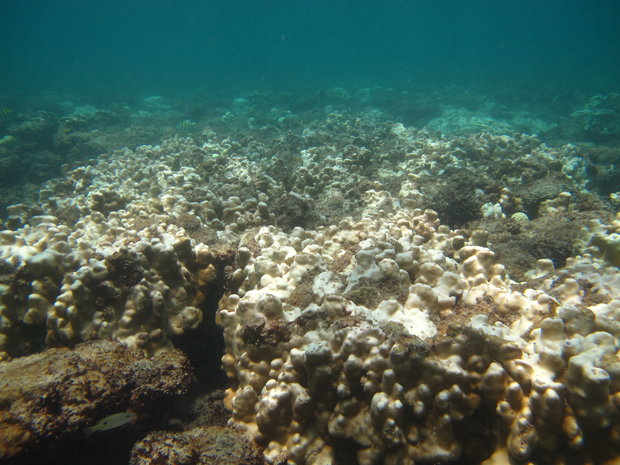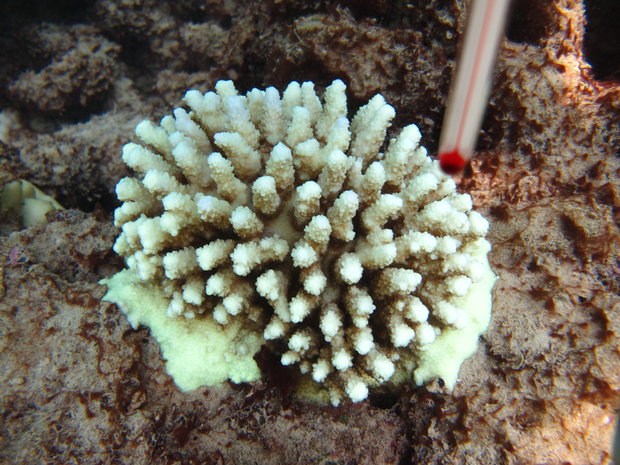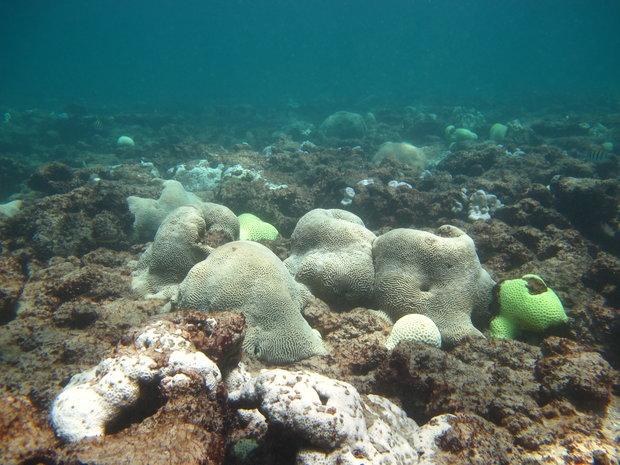Dying out of corals distorts the natural marine ecosystem, inter alia, the extinction of diverse marine species of flora and fauna. Research shows that Persian Gulf is home to different species of corals which have not survived the harmful effects of global warming, and a deadly white hue indicates the shadow of a gradual death looming around.
The head of Qeshm Free Economic Zone tells Mehr News local correspondent that a growing temperature of Persian Gulf waters had contributed to bleach —a process in which corals expel their symbiotic algae living in their tissue, causing them to turn white and increasing their vulnerability to disease and death— of the corals; Mohammad Hashem Dakhteh adds further that rising water temperatures have a grave danger for bleaching; “research indicates declining resistance to rising temperatures in water especially in summers; according to global surveillance of earth temperatures, a spot in Persian Gulf has been detected as the hottest spot on earth, and if the trend continues, we will see the dying out of the corals anytime soon,” he adds, “in recent summers, bleaching has been only partial, and with summers passing, they usually recover their natural hues; however, with continuous bleaching along with increased vulnerability, now more resistant species also undergo bleaching, and there are concerns that the bleaching would be permanent, thus causing coral death.”

Mohammad Ghavvasi, a Marine Ecosystem expert at Qeshm Free Economic Zone, says of extensive international body of research on current condition of Qeshm corals, by Coral Watch, a Queensland University surveillance center in Australia, which had found that more than 70 per cent of the corals were exposed to bleaching. “These marine species grow in millimeter scales and hundreds of years should pass until a coral reef is formed; corals are in a symbiotic relationship with a sort of microscopic photosynthetic alga, which provides the corals with their colours; alga provides corals also with energy through photosynthesis. However, when temperature rises, alga dies, and with it the colour of the corals fades away,” says he.
“With alga dead, coral survives for a while, but it becomes very week due to energy shortage, becoming vulnerable to the slightest unfavourable conditions in water such as pollution; regular surveillance of the trend of changes in coral ecosystem is necessary to examine this phenomenon and would help accurate prediction of changes and taking proper measures to meet the conditions,” Ghavvasi tells Mehr News local correspondent.

He then goes to comment on the possible measures which would effectively protect corals; “establishing marine reserve parks, deviating influx of tourists from corals through adding to attractions of other regions, reviving corals through implants of other corals, and deploying special marine patrol are possible options; raising public awareness of causes of global warming, preparing and distributing informative catalogues to local people as well as tourists are crucial in survival of corals,” Ghavvasi emphasizes.
“Human industrial activity has a very pernicious effect on nature, most of which are easily detected in the land; however, the effect on marine ecosystem is less noticed; coral expenses in the sea are the most diverse marine ecosystem type and their death would cause extinction of wide range of other species, with quite irrevocably harmful effects in long term,” laments the expert. “Even now, the measures taken to address global warming are belated, and already many plant and animal species are under the shadows of extinction; however, to prevent more damage, the harmful effects of human activity should be reduced; with global attention focused on and international organizations cooperating in the issue, moving toward reduction of greenhouse gas emissions to save the earth ecosystem from further onslaught is key to success,” he invests hope.
The concluding remarks of the expert destroys shreds of hope for the future, offering some, though; “industrial activity and harsh behaviour of earth have put on jeopardy the life on earth, and the Persian Gulf is not an exception; we should not forget that saving natural ecosystem is a human as well as moral duty, and soon proper approaches should be devised in short-, mid-, and long-term bases to avoid a gradual dying out of the earth,” Ghavvasi tells Mehr News at the end of the interview.
Report by: Leila Hamzeh Kheirabadi
























Your Comment